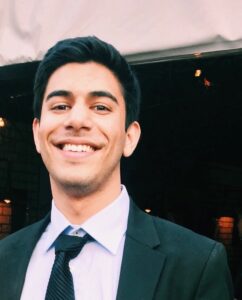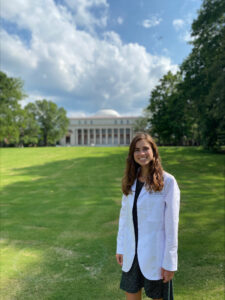Social Mission Committee welcomes new leaders
M3 students Rishub Das and Kayla Buttafuoco look forward to cementing Social Mission Committee initiatives as integral parts of VUSM and VUMC
By: Lexie Little
The Social Mission Committee (SMC), officially founded as a student organization at Vanderbilt University School of Medicine in 2019, quickly became a foundational pillar for student initiatives in and out of the classroom.
In its first three years, SMC created a Medical Student Guide to Advocating for Patients, established regional service partnerships, supported underrepresented pre-medical students, and connected students to faculty interested in health equity and social mission for mentorship. In the 2021-22 academic year, students also joined the broader effort of the Racial Equity Task Force to develop a Race in Medicine curriculum exploring structural racism and its intersection with medicine, particularly in the first- and second-year curriculum.
SMC dedicates efforts to affect change in five key areas: education, mentorship, recruitment, research, and service.
Current MD students elect incoming leadership each spring. M3 students Rishub Das and Kayla Buttafuoco now assume new roles as co-presidents for the 2022-23 academic year. Das previously served as the M2 student liaison and Buttafuoco dedicated her time to initiatives like the Nashville Neighbors project, a recent service initiative dedicated to supporting the refugee population in Davidson County.
Meet Rishub and Kayla

Das, a Vanderbilt undergraduate alumnus, majored in Medicine, Health, and Society. The interdisciplinary focus contextualizes topics like policy, economics, law, and sociology within health care.
“I was able to explore how our health care system operates, and I had an inkling that I wanted to pursue a career in medicine,” he said. “I knew for sure I wanted to do something in terms of reform in our health care system. Going into medical school knowing that, I thought Social Mission Committee totally unique. Not many medical schools, if any, have a Social Mission Committee. That was one of the aspects that drew me to this effort. This student-run initiative is working to change the health care system.”

Buttafuoco took a similar interest in health equity through her undergraduate studies at Washington University in St. Louis, where she studied anthropology and explored public health. That coursework contributed to her interest in the political economy of health care and health disparities education.
With passions for equity and health, Buttafuoco sought a medical school that would support education and initiatives surrounding issues important to her and her future patients.
“I didn’t want to be removed from those issues that had become so important to me,” she said. “SMC allows [these challenges] to be ingrained in me and everyone who is being trained in medicine [here].”
Beyond prior passion, both attribute their initial involvement with SMC to the inspiring example of the Class of 2021 leaders that spearheaded pivotal initiatives like the medical student advocacy guide.
The guide, which serves as a reference source for students in clinical spaces, provides information and resources related to patient advocacy in areas like mental health, reproductive health, minority health, LGBTQ+ health, and socioeconomic status.
Now, Das and Buttafuoco look forward to continuing important work in the Nashville community.
“I’m excited to take on this leadership role,” Das said. “When a new student sees someone else who is so interested in a topic, maybe something they hadn’t realized they’re also interested in or something that resonated with them, that will spark a passion in them, and you don’t know what that great outcome could be in that cycle you’ve started.”
Outlining goals, priorities, and paths forward
This year, Das and Buttafuoco hope to incorporate social mission work into the school as a sustainable component of overall mission and initiatives, starting with visibility and recruitment in the community.
SMC intends to work closely with leadership and faculty to ensure initiatives continue well into the future, encouraging social mission work by all members of the community, not just student-driven efforts.
“This started out as a student-run initiative,” Das said. “We are in medical school. We have many facets of our education and our personal lives that need attention. While we commit to this health equity work and give it our full attention as we can, we hope that others in our community will join us to sustain positive change and make sure the workload needed to address these challenges does not fall entirely to students.”
Last year, SMC strengthened community partnerships with local organizations such as Siloam Health and Open Table Nashville. A team of students led by M2 Mae Wimbiscus worked with Siloam Health’s Nashville Neighbors program to promote wellness among newly arrived refugees and build relationships between those families and the Nashville community. She now joins the SMC executive board as the M2 Liaison. VUSM students also volunteered at Open Table Nashville’s weekly food clinic for unhoused community members.
Retaining regional partnerships and taking a greater role in leadership through op-ed publications and research will allow SMC to raise its profile and encourage others to get involved.
“If we can develop relationships with community partners, that might be one way we can sustain all of our initiatives,” Das said. “We hope our projects will become permanent components of the regional agenda… We hope to take on an even greater role as leaders in the community and our field. We plan to publish Op-Eds in local newspapers and reach out to various journals as well. Even if it’s not a stance on a current topic, say it’s a new change that happened, we could provide some basic fact-based information (not medical advice) related to that change or policy. One of the Op-Eds I wrote for The Tennessean covered when patients could start accessing notes online. That piece strictly informed patients that they had access to what their providers wrote in their charts, increasing transparency.”
Buttafuoco echoes that intention, looking internally as well as externally.
“We want to make sure Vanderbilt students feel integrated as part of the Nashville community and find meaningful connections beyond the classroom,” she said.
Getting involved
Students looking to get involved in social mission work at VUSM may join initiatives under six subcommittees: education, service, recruitment, research, mentorship, and monitoring & evaluation.
“The best part of SMC is our recognition that people are busy at different times,” Buttafuoco said. “People who want to be involved can jump in at any time. All of the subcommittees have regular meetings, and we plan to send emails to all MD students from time to time with dates, times, and information for upcoming subcommittee meeting.”
Buttafuoco and Das found encouragement for the upcoming year as they accepted applications for the executive board, the leaders of each subcommittee and class liaisons. They received a record number of applications and selected a motivated group of incoming leaders:
- Director of Operations: Hannah Light-Olson
- Education: Kaitlin McKernan
- Mentorship: Andrea Lopez
- Monitoring & Evaluation: Diane Lee
- Recruitment: Dominique Mosley
- Research and Policy: Malini Anand
- Service: Anna Henricks
- M2 Liaison: Mae Wimbiscus
“We’re very excited to work with our executive board,” Das said. “Every member plays to their strengths for their roles.”
While Das and Buttafuoco acknowledge the topics and issues SMC addresses can be intimidating in scope and scale, many members of the VUSM community share passions for service and missions. Students who want to get involved will find supportive peers and faculty.
SMC welcomes student involvement at any time, to any degree. Leaders encourage diverse perspectives and discussions about experiences, lived or observed, in a safe environment. They invite all who wish to be involved to get involved, regardless of experience or availability.
“The more people who are involved and who care about social mission at any point, the more we can work to establish these important initiatives as sustainable parts of VUSM,” Buttafuoco said. “My favorite thing about SMC is that it’s not just run by leaders like us. Any student can bring an idea like wanting to connect with an organization or suggesting a case study for case-based learning. Anyone can lead a project under SMC.”
As Das said, “You can see changes that you want to see.”
For more information about SMC and its work, view the 2021-22 annual report.
